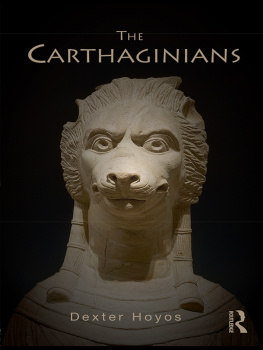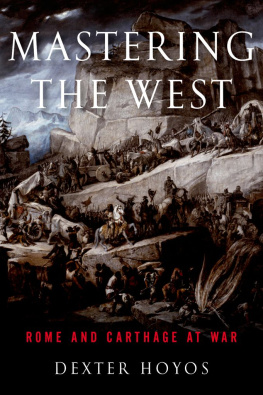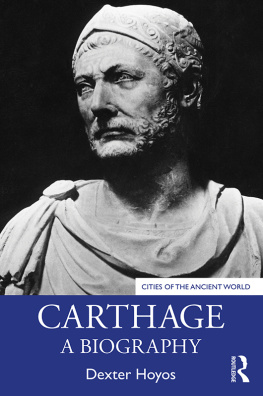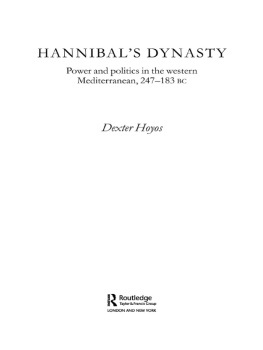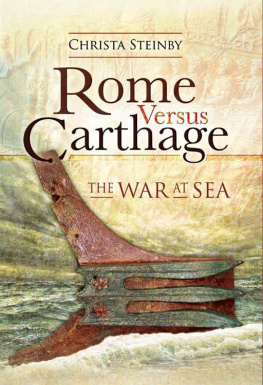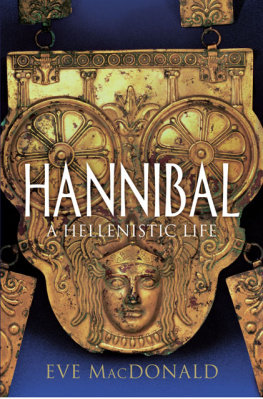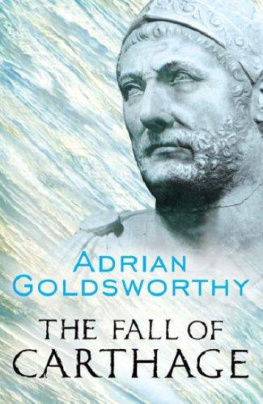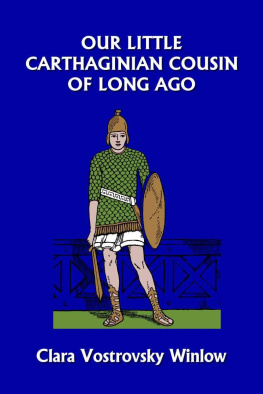THE CARTHAGINIANS
The Carthaginians reveals the complex culture, society and achievements of a famous, yet misunderstood ancient people. Beginning as Phoenician settlers in North Africa, the Carthaginians then broadened their civilisation with influences from neighbouring North African peoples, Egypt, and the Greek world. Their own cultural influence in turn spread across the Western Mediterranean as they imposed dominance over Sardinia, western Sicily, and finally southern Spain.
As a stable republic Carthage earned respectful praise from Greek observers, notably Aristotle, and from many Romans even Cato, otherwise notorious for insisting that Carthage must be destroyed. Carthage matched the great city-state of Syracuse in power and ambition, then clashed with Rome for mastery of the Mediterranean West. For a time, led by her greatest general Hannibal, she did become the leading power between the Atlantic and the Adriatic.
It was chiefly after her destruction in 146 BC that Carthage came to be depicted by Greeks and Romans as an alien civilisation, harsh, gloomy and bloodstained. Demonising the victim eased the embarrassment of Romes aggression; Virgil in his Aeneid was one of the few to offer a more sensitive vision. Exploring both written and archaeological evidence, The Carthaginians reveals a complex, multicultural and innovative people whose achievements left an indelible impact on their Roman conquerors and on history.
Dexter Hoyos writes on Latin teaching and ancient history. His books include Unplanned Wars (1998), Hannibals Dynasty (Routledge, 2003), Truceless War (2007), and Hannibal: Romes Greatest Enemy (2008). He has retired after 36 years at Sydney University to continue research work on Romans and Carthaginians.
PEOPLES OF THE ANCIENT WORLD
This series stands as the first port of call for anyone who wants to know more about the historically important peoples of the ancient world and the early Middle Ages.
Reliable, up-to-date and with special attention paid to the peoples enduring legacy and influence, Peoples of the Ancient World will ensure the continuing prominence of these crucial figures in modern-day study and research.
THE ROMANS
An Introduction Second Edition
Antony Kamm
THE GREEKS
An Introduction to their Culture Second Edition
Robin Sowerby
THE PERSIANS
Maria Brosius
THE TROJANS AND THEIR NEIGHBOURS
Trevor Bryce
MYCENAEANS
Rodney Castleden
THE EGYPTIANS
An Introduction
Robert Morkot
THE BABYLONIANS
An Introduction
Gwendolyn Leick
THE ISRAELITES
An Introduction
Antony Kamm
THE CARTHAGINIANS
Dexter Hoyos

LONDON AND NEW YORK
First published 2010
by Routledge
2 Park Square, Milton Park, Abingdon, Oxon OX14 4RN
Simultaneously published in the USA and Canada
by Routledge
270 Madison Avenue, New York, NY 10016
Routledge is an imprint of the Taylor & Francis Group, an informa business
This edition published in the Taylor & Francis e-Library, 2010.
To purchase your own copy of this or any of Taylor & Francis or Routledges collection of thousands of eBooks please go to www.eBookstore.tandf.co.uk.
2010 Dexter Hoyos
All rights reserved. No part of this book may be reprinted or
reproduced or utilised in any form or by any electronic,
mechanical, or other means, now known or hereafter invented,
including photocopying and recording, or in any information
storage or retrieval system, without permission in writing from
the publishers.
British Library Cataloguing in Publication Data
A catalogue record for this book is available from the British
Library
Library of Congress Cataloging in Publication Data
Hoyos, B. D. (B. Dexter), 1944
The Carthaginians / Dexter Hoyos.
p. cm.
Includes bibliographical references.
1. Carthaginians. 2. Carthage (Extinct city)--Civilization.
3. Carthage (Extinct city)--History. I. Title.
DT269.C34H69 2010
939.73--dc22
2009048666
ISBN 0-203-85132-3 Master e-book ISBN
ISBN 10: 0-415-43644-3 (hbk)
ISBN 10: 0-415-43645-1 (pbk)
ISBN 10: 0-203-85132-3 (ebk)
ISBN 13: 978-0-415-43644-1 (hbk)
ISBN 13: 978-0-415-43645-8 (pbk)
ISBN 13: 978-0-203-85132-6 (ebk)
TO THE MEMORY OF MY FATHER, BEN
(19132009)
CONTENTS
note: Punic writing, like Phoenician and Hebrew, did not use vowels. Modern transliterations of Punic words and names therefore do not add vowels, but in places I add a written-out version of a word for greater clarity.
ACKNOWLEDGEMENTS
It is a special pleasure to acknowledge the encouragement, collaboration and help which many people and institutions have generously given as I prepared The Carthaginians. In first place I must thank Richard Stoneman for suggesting the topic and readily accepting my optimistic outline when he directed classical publications at Routledge. Routledges support for the work has continued steadily since then, in spite of my slow work and distractions, and I owe much in the latest stages of composition to the firm and friendly guidance of my series editor Lalle Pursglove. Sydney University, my professional centre for thirty-six years, has provided invaluable facilities for my research even after I left full-time academic life for what I thoughtlessly supposed would be serene retirement. Sydney University Library in turn is one of the most supportive institutions that I know for scholarly work, in both its facilities and its staff.
The illustrations for the book I owe to a generous range of scholars and institutions. Professor Mhamed Hassine Fantar, Titulaire de la Chaire Ben Ali pour le Dialogue des Civilisations et des Religions at the University of Tunisia, gave me immediate permission to use images from his vividly illustrated book Carthage: La cit punique, and so did its publisher, CNRS Editions of Paris. The Institut National du Patrimoine in the Ministre de la Culture et de la Sauvegarde du Patrimoine, Republic of Tunisia, and its Directeur Gnral Professor Fathi Bejaoui have with equal generosity authorised me to reproduce images of Carthaginian materials held in the great museums of Tunisia. The Badisches Landesmuseum of Karlsruhe, Germany, in turn authorised me to use two evocative photographs in its possession.
Most images themselves are taken, in turn, from the splendid volume edited by Sabine Peters, Hannibal ad Portas: Macht und Reichtum Karthagos, published by Theiss Verlag of Stuttgart, Germany, to accompany the wide-ranging exhibition of Carthaginian, Phoenician and related artefacts presented at the Badisches Landesmuseum in 2004. Theiss Verlag, through its executive in Programmleitung Mr Rdiger Mller, has both encouraged my efforts and granted me the permission to make the necessary scans of images from that work.
The selection of coins I owe to the renewed kindness of my university colleague and friend Dr Stephen Mulligan of Sydney, who combines a distinguished professional career in haematology with an expert knowledge of Carthaginian numismatics. The high-quality coin images were made by Colin Pitchfork and Bob Climpson of Noble Numismatics Pty. Ltd., Sydney, who found the time for this task in spite of their own busy commitments.

